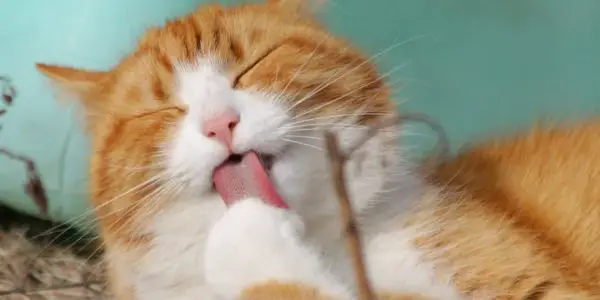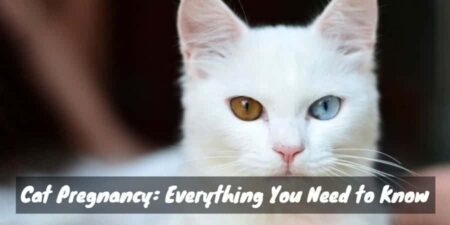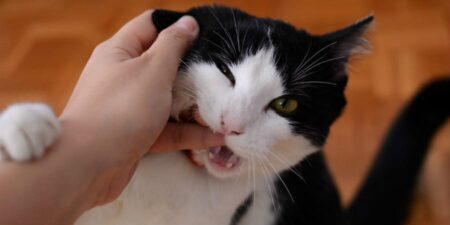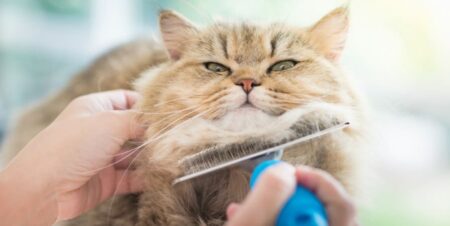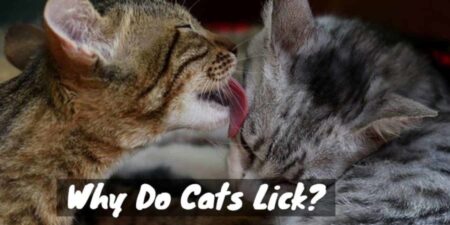We’ve all seen our cats grooming themselves throughout the day, but sometimes the constant licking and biting can start to get out of hand. If your cats are starting to pull out clumps of their own hair, the primary reasons are stress, skin conditions, or parasites. These issues, for the most part, can be quickly resolved, and your cat can be back to feeling happy and healthy in hardly any time.
Reasons Cats Pull Out Their Hair:
1. Stress
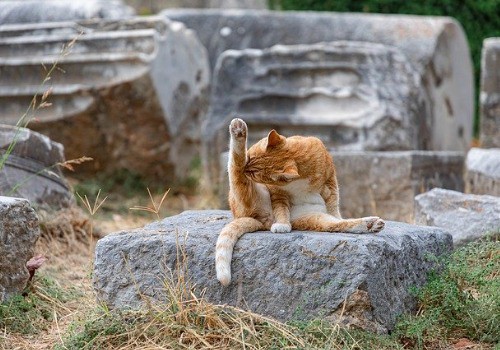
Just like humans, cats can easily get stressed out by sudden changes. If you’ve just moved houses, or if there’s some change in the family, or even if you’ve just rearranged the furniture, your cat may cope by grooming obsessively. While it may help your kitties cope, it can also result in hair loss and bald spots and can be hurting them more than it helps.
[amazon bestseller=”cat stress relief”]
This is the most common cause of obsessive grooming in cats, and the good news is that it’s a pretty easy fix! Make sure your cats have plenty of time to adjust to your house and everything in it and try to keep it as stable an environment as possible. If a sudden change in scenery or location is unavoidable, cat calming products like Feliway are a good way of making sure that your cats don’t feel too stressed.
In some cases, if you’ve done your best to keep your cats in a stable environment, but they’re still displaying signs of distress or anxiety, talk to your veterinarian about prescribing an anti-depressant for your cats. Like humans, cats can suffer from neurological unbalances that can make it harder for them to live a happy, healthy lifestyle, so giving their brains the chemical balancing supplements that they need can help them face changes in their daily routine with a much more confident approach, and reduce the likelihood of stress-driven grooming.
If you’ve reduced the number of stressful changes in your house that could trigger your cat’s obsessive grooming and the problem still hasn’t gone away, don’t rule out stress as one of the factors. Oftentimes, unusual behavior in cats is caused by a combination of multiple factors, and there could be multiple issues at play as you try to keep your cats happy and healthy.
2. Parasites
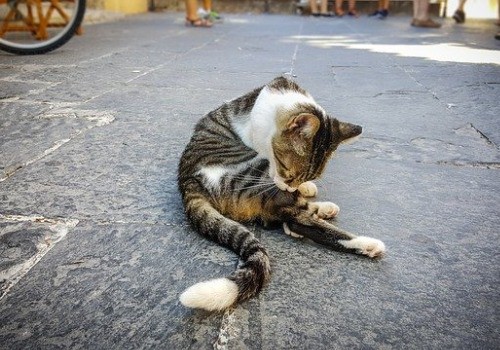
Especially if you live in a densely wooded area, or if your cats spend most of their time outside, parasites like ticks and fleas can be one of the biggest causes of your cats pulling out their own hair. Because cats are such fastidious groomers, they can actually remove some of the evidence of fleas, making them harder to detect.
If you think your cat may be suffering from tick or flea bites, check for signs in places that your cat may be having trouble reaching. This includes areas like right behind the areas, the small of the back, or the head of the tail. Fleas will often leave scabs on the neck and flaky skin on the back, so check to make sure your cat isn’t being bitten.
[amazon bestseller=”cats flea shampoo”]
Other parasites like ringworm may be harder to spot, due to your cat’s thick fur and clean behavior. Generally, bald patches where the skin is thicker and hair doesn’t grow can be a sign of ringworm. Look also for lesions on the chest, head, forelegs and along the spine, or growths of skin around the hair follicles.
Parasites can be scary, but the good news is that the most common pet parasites are relatively easy to treat! Anti-flea medication can be purchased at most pet stores, and special shampoos, lotions, and combs will help your cat get rid of those pesky parasites in no time at all. Comb your cat’s fur carefully with a flea comb, and then give them a quick bath with warm water and an anti-flea shampoo, and your cat should be feeling better almost immediately.
For ringworm, it’s best to combine treatments for a more complete effect. Like with fleas, most pet stores will have anti-fungal shampoos that will help your cat’s skin fight off the parasitic fungus that causes ringworm. If your cat’s hair is still growing in, you may have to shave or clip the hair and apply a cream or lotion directly to the affected skin. Give the cat an anti-fungal bath and consult with your veterinarian as to specific treatments that may be effective.
In addition to the skin treatments, however, talk to your veterinarian about getting anti-fungal or anti-parasitic medication to add to your cat’s food. Especially if your cat is taking medical supplements in addition to the periodical skin treatments, this can go a long way towards making sure your cat stays pest free and
3. Skin Conditions
Depending on where your cat starts losing hair, the reason for constant itching, irritation, and hair-pulling may be an underlying skin condition. Conditions like acne and dermatitis are common among cats, and easily treatable so that your cat will be feeling better with just a few quick treatments and maybe a trip to the vet.
Feline Acne
Cat acne is one of the most common forms of skin conditions for cats and usually shows up as a bald, red, or irritated patch of skin beneath your cat’s chin. No one knows the exact cause, but some general causes usually boil down to hygienic concerns. For example, if your cat often rubs their chin against things to mark territory, it can be easy to pick up bacteria from other animals.
Similarly, if your cat’s food bowl or water dish is not regularly cleaned, or if your cat has to dip their chin into the water in order to drink, the bacteria inside the dish can infect your kitty’s skin and lead to canine acne. As your cat’s chin becomes more inflamed, they may start to groom obsessively as a self-soothing practice, which can lead to hair loss and bald patches.
If you notice what looks like dirt underneath your cat’s chin, but can’t wipe it away, try using a warm compress to clean the affected area or use an old toothbrush to regularly brush beneath your cat’s chin and help keep it clean. Not only will this help prevent any bacteria from growing, but your cat will love getting an extra special brushing!
Cat Dermatitis
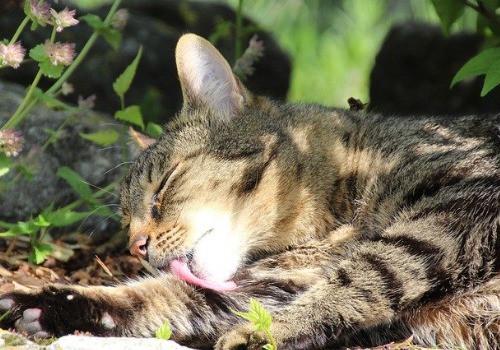
Feline dermatitis usually refers to any skin condition that results in red, itchy growths on your cat’s skin, especially around the hair follicles. If you notice that your cat is “absentmindedly” chewing, grooming, or scratching seemingly every time they lie down, odds are good that they’re affected by dermatitis. Keep an eye out for small, red bumps that can cause itching and irritation.
Your vet can provide over-the-counter medication that will help prevent these bumps from driving your cat to itch and scratch, and most pet stores offer anti-inflammatory shampoos and lotions that will at least keep the itching to a minimum. If your cat isn’t feeling the constant itch, they’re much less likely to pull out their hair.
[amazon bestseller=”cat dermatitis treatment”]
Other Factors
The causes listed above are the most common causes of obsessive grooming, but there may be other considerations that are specific to your situation. As mentioned above, in most cases, behavior problems are caused by several factors stacking up on top of each other, and factors like weather, allergies, and day-to-day injuries can all add to the problem.
During the winter, when the air is cold and dry, your cat’s skin can dry out as quickly as yours can, and the dryness can lead to itchy skin, which can lead, in turn, to constant grooming as your cat tries to scratch that itch. Help your cats stay hydrated during dry seasons by feeding them a higher-fat diet and making sure that they have access to plenty of fresh water.
Like humans, cats can develop allergies to any number of allergens, and the constant itching and irritation can drive your cats to itch and lick at sensitive skin. Any antihistamine product can go a long way towards reducing your cat’s discomfort and stop them from pulling out the hair in irritated areas.
Finally, if you notice your cat grooming one particular area of their skin without stopping, check to make sure they’re not injured. In many cases, a scrape from running around the house can become irritated and inflamed, and your cat will keep grooming that area in an attempt to clean or soothe the wound.
[amazon bestseller=”Grooming Brush”]
Conclusion
Seeing your cats with angry-looking patches of skin or watching them pull out tufts of their own hair can be a scary experience, but there’s no need to panic! Usually, a cat’s obsessive grooming can be explained by one of the entries on this list, and most of the problems can be addressed quickly and easily so that your cats will be back to their usual charming selves in hardly any time at all.
Why Is Your Cat Losing Hair? (Video)
"In ancient times cats were worshipped as gods; they have not forgotten this."
-- Terry Pratchett

